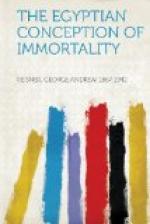When Christianity came into Egypt, all the gaudy apparatus of the Osiris religion was swept out of existence. The body was to rise again and might not be mutilated. Mummification, which destroyed the body in order to preserve a conventional simulacrum, ceased abruptly. Grave furniture was of course unthinkable. But the use of charms did not cease. Crosses were embroidered in the gravecloths; or small crosses of metal or wood placed on the breast or arm; the gravestone bore a simple prayer to the Holy Spirit for the peaceful rest of the soul. But the offering place was still maintained; prayers were recited on the feast days; lamps were allowed to remain at the grave; food was brought, but given to the poor.
In all periods there are thousands of graves of poor people without a single thing to secure their future life,—people who were probably content simply to lay down the burdens of life. In the Christian period these thousands of unnamed dead all have one mark. They are laid with their feet to the east. Each one was a Christian and secure in his future life, according to his faith and his life on earth.
IX. SUMMARY
To sum up, the essential idea of the Egyptian conception of immortality was that the ghost or spirit of the man preserved the personality and the form of the man in the existence after death; that this spirit had the same desires, the same pleasures, the same necessities, and the same fears as on earth. Life after death was a duplicate of life on earth. On earth life depended on work, on getting food from the fields and the herds, on forming stone and metal, hide and vegetable fibre, into useful objects. In other words, life depended on human power over the natural materials of the earth. At the same time there were many things which could not be controlled by power over the earth and its elements,—the sting of the scorpion, the bite of the adder, the rise of the Nile, sickness, the sudden onslaught of the enemy, the straying of cattle, the disfavor of the god. For these evils man’s only hope was magic,—the set words spoken in the proper manner which have power over all unseen influence. So in the case of life after death, all which human strength can provide of stores of grain and drink and garments must be secured for his use; but he must also be provided with the magic words to meet the chance evils of the future life.
It is not surprising that the unknown future presented to the imagination many evils unknown on earth. The spirit might forget its name, it might lose its heart, it might be bound fast by evil powers in the grave and unable to come forth by day. The mummy might decay; the spirit might forget its form. So, as time went on, the use of magic words became of greater and greater importance, until, to modern eyes, it seemed to overshadow all else in the Egyptian conception of life after death.




